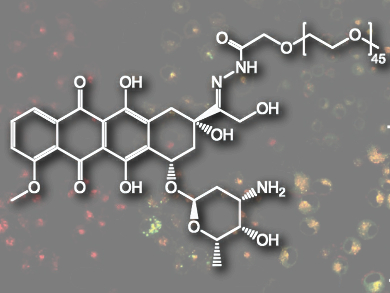Cancer cells can become chemotherapy-resistant, meaning they are able to survive multiple different anticancer drugs. One approach against such cancers is the use of nanosized drug-delivery systems. They can improve the cell’s drug uptake and the drugs’ efficacy. Doxorubicin is an effective chemotherapy agent against many types of cancer. However, resistance to this drug is relatively common.
Meihua Sui, Zhejiang University College of Chemical and Biological Engineering, Hangzhou, China, and colleagues have developed a new doxorubicin prodrug, which can self-assemble into stable nanoparticles. The team combined polyethylene glycol (PEG) with doxorubicin via a hydrazone linker to give the prodrug. Using a solvent evaporation method, nanoparticles were prepared from this amphiphilic conjugate. The nanoparticles have a drug loading of about 20 wt%, and diameters of 80–100 nm.
The researchers tested the conjugate drug’s effect against the multidrug-resistant cancer cell lines MCF-7/ADR and KBv200 in vitro. The nanoparticles allowed the drug to accumulate in the cells and helped to significantly increase its therapeutic efficacy against resistant cells. Additionally, the conjugate drug showed lower toxicity than free doxorubicin in mice. According to the team, the drug could be a promising alternative for doxorubicin and help to overcome drug resistances.
- Self-Assembling Doxorubicin Prodrug Forming Nanoparticles and Effectively Reversing Drug Resistance In Vitro and In Vivo,
Xiaoman Mao, Jingxing Si, Qian Huang, Xuanrong Sun, Qianzhi Zhang, Youqing Shen, Jianbin Tang, Xiangrui Liu, Meihua Sui,
Adv. Healthcare Mater. 2016.
DOI: 10.1002/adhm.201600345




